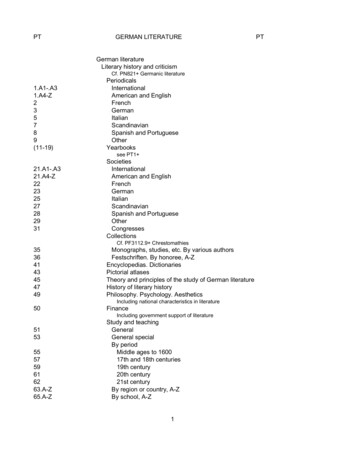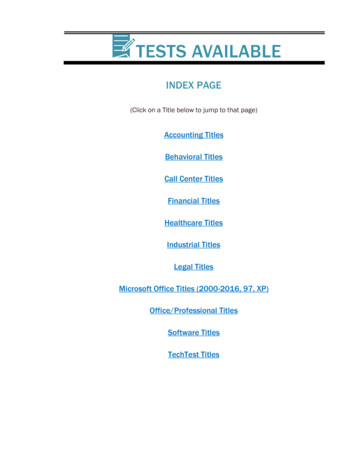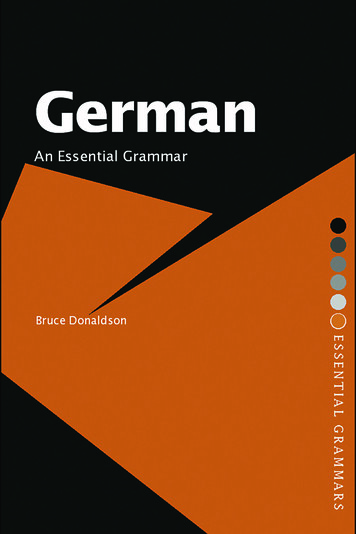
Transcription
presentsGermanHow to get a H1 in the Leaving CertGerman Examby Gráinne D.Gráinne got a H1 in her higher Leaving Cert German paper. She is currentlystudying General Engineering in UCC. Here she shares what she learned.
German is the most widely spoken native language in Europe, but it is only the 2nd mostpopular foreign language taken by Leaving Cert students. With only 6.6% of higher levelGerman students receiving a H1 in 2016, more and more students are opting to studySpanish or Italian.German, unlike many typical Leaving Certificate subjects, is hard to predict and doesn’tencourage rote learning, similar to spoken languages in real life.I decided to study German at second level, as I was lucky enough to study it for a year in6th class. Having previously traveled to Germany, I found the language to be more usefulthan French. After studying the language for 5 years at second level, I hope that this guidecan help you optimise your grade and achieve that H1 in August!ContentsWhat should my study technique be? . 3The Oral Exam. 5The Reading Comprehension . 7The Grammar Section . 9The Written Section . 10The Listening Comprehension . 12Some Final Tips . 132
What should my study technique be?German is quite a broad course, which is heavily based on being exposed to the language rather thansitting at a desk for hours learning reams of information. Luckily, studying in small chunks, but often,is ideal in order to succeed in German. These tips should help you focus your study on certainaspects of the course and subsequently improve your German.% Flashcards:Flashcards: I personally found that flashcards were the most successful way to revise German.This particularly applied to me when we had finished a topic in class e.g. school, and then Iwould write words down on a flashcard that evening. This insured that the vocabulary stayedfresh in my head and if I ever needed to revise a certain topic, I would just have to look back atthe flashcard and try to recall the words.% Films and Books:Books: German is a language and you can’t become fluent in by just learning offvocabulary.vocabulary In class, we would initially watch films such as Shark Tale in German, as thelanguage in it is simple to understand. Then as our German progressed, we watched moreadvanced films like Goodnight Lenin. You might not get the chance to do this in class but youcan definitely do this at home too! Reading books or even German reading comprehensions inyour book or exam papers allow you to improve your German, as you are immersed in thelanguage, and the more vocabulary you are exposed to, the more fluent you will become.% Internet:Internet: With today’s technology, it has never been easier to learn German outside of theclassroom. In my German class, we often went to the computer room and usedlanguagesonline.org.uk, as we could learn new vocabulary and improve German through avariety of games. Even using apps, such as Duolingo, allow you to track your progress and setgoals to accomplish. These insure that learning the language remains fun and can be tailoredto your level.% Exam Papers:Papers: Exam papers are vital to success in German.German Students can often run out oftime due to the tight time constraints, so it’s important to practice your timing. Try to initially3
practice various questions - reading comprehensions in particular - by trying to answer thequestions without using notes or a dictionary. As tempting as it may be to use a dictionary, youare more likely to learn a new word or phrase by making the mistake and then revisiting thatparticular question the following evening. You can practice this easily on Studyclix using theExam Builder or Print Questions feature to print out any questions you want to practice.% Conversation:Conversation: The oral is one of the biggest aspects of the German course and in order to get aH1, so you need to put a lot of work into it. I would recommend that you ask your Germanteacher to do a mock oral every couple of weeks or else decide to only speak German withsome of your classmates on a certain evening as the oral approaches. If this isn’t possible,write out a common list of questions that you can be asked in your oral and sample answersto accompany them and ask a parent/guardian/friend etc. to quiz you, so you can revise thekey phrases that you want to say in the oral exam.4
The Oral ExamThe oral exam is worth 25% at higher level (100 marks) and therefore shouldn’t be overlooked if youwant to get a H1. It consists of the picture sequences or project, roleplays and general conversationand lasts about 15-20 minutes.% General Conversation:Conversation: This is clearly the most important part of the oral as it counts for 40 ofthe total 100 marks. A great way to do well is to have all your main topics wellwell- rehearsed(school, local area, hobby, Germany, job, next year etc.), try to also have a few colloquialphrases or sayings prepared.prepared The main thing to remember is that the examiner is there togive you marks and if you simply don’t understand what they said, know how to ask them torepeat or rephrase the question. You are always asked if you want to discuss a German film ortext, so be prepared to answer that question if you have.% Picture Sequences:Sequences: If you choose to study the picture sequences, the 30 marks allocated arebroken down into 10 marks for telling the story, 10 marks for questions based on the story, aswell as a future prediction and 10 marks on the theme of the picture sequence. There are 5picture sequences which consist of 5-6 smaller pictures. Each picture needs to be 3-4sentences long, so don’t worry if your picture sequence isn’t 30 lines long. To avoid stress,make sure you practice them every week and are very familiar with them. This is notsomething you can cram.% Project:Project: This is the other option which you can choose. I personally would choose the picturesequences, as you can rehearse them and quite often and the actual exam paper includesthemes found in the picture sequences. Your project can be based on anything on the Germancourse e.g. Sport in Germany or German food. Most marks are allocated for discussing yourproject in general, with 10 marks going for questions based on the general theme of yourproject.% Roleplay: Similar to the picture sequences, it is vital to revise them. They are also worth 305
marks and there are 5 to revise. Make sure you know each point inside out, but if you do forgetone on the day, the examiner generally goes back to the point. Vocabulary and accuracy areworth 10 marks, so try to focus on those when revising. Also, remember what role you’replaying, because if you begin to read the wrong point, it suggests that you haven’t revised.% General advice: The German oral exam is so much easier than both French and Irish orals, sothe likelihood of getting a H1 in the oral is higher.Don’t panic on the day, everyone gets nervous, so make sure you have a decent bank ofvocabulary and phrases to fall back on in case you go completely blank.blank If you make a fewmistakes, it doesn’t mean that you have no chance of getting a H1, as the examinerunderstands that you are human and can make mistakes.Make sure to expand on your points.points Don’t just reply by saying “yes” or “no”. E.g. if theexaminer asks you if you like German, they are leaving the question open to discussing whatyou do in class or if you went on a school tour to Germany, they don’t want just a yes/noanswer.6
The Reading ComprehensionThe two reading comprehensions on the paper are together worth 120 marks, which is more than theoral and makes up the majority of the written production marks (220m)! The first readingcomprehension is generally an extract from a fictional story, whereas the second readingcomprehension is based on real life events, people or organization.% Timing:Timing: This is often the biggestchallenge,especiallyfirstof question 1 are generally in German,reading comprehension. You shouldtherefore answer them in German, asspend 40 minutes on the first readingotherwise you will lose a lot of markscomprehension, which includes theeven if your answer was correct. Thetimedetailedrest of the questions are in English andquestion 4 and 30 minutes for thetherefore you should answer them insecond reading comprehension.English.allocatedforinthe% Answering Questions:Questions: The first 4 partsthe% How to approach it:it: I personally% German Questions:Questions: For the Germanpreferred to read the questions first toquestions, make sure you know whatget an idea about the text and with athe different questions mean e.g.highlighter,mostWann? (When?), as many people oftenimportant words in the question toget confused between them and canfocus on what’s important in the text.lose a lot of marks.highlighttheAfterwards quickly read through thetext, keeping an eye out for relevantdetail to the questions, which you canalso highlight.7
% Question 4:4: This is the most weightedquestioninthefirstreading% Detail:Similartothelisteningcomprehension, detail is required incomprehension and is based on youreveryanswer,answeraseachreadingunderstanding of the text. The markingcomprehension is worth 60 marks.scheme is generally broken down intoWhen answering question 1 in German,4x3m or 3x4m and the questionmake sure you don’t directly copy lotsrequires you to read the text again toof details from the comprehension asgive sufficient detail. Always try to giveyou will lose marks, so try to write thean extra point in case one of youranswers in your own words.points isn’t detailed enough for a mark.8
The Grammar SectionAt 25 marks, I recommend that you spend approximately 15 minutes on this section. As it is worth thefewest marks, I would leave it until the end, because if you are running out of time, you can quicklyfill it out. The section is based on the first reading comprehension and tests you on your knowledgeof the different cases and grammatical rules.% Marking scheme: Marks are split up into 2 sections, with one of the sections based on yourability to recognise the different forms of grammar and the other section based on your abilityto write grammatically correct sentences or questions.% Tenses: This is one of the most common questions asked. They often give you a sentence fromthe text and ask you to change the tense or ask you what tense it’s written in. Therefore, youshould know the irregular verbs and how they are written in the past tense, perfect tense,past perfect tense (plusquamperfekt), present tense, future tense and the conditional mode(e.g. I would ).% Gender:Gender Unlike English, German nouns each have a gender and they are often asked in thegrammar section, therefore when learning off words, pay attention to the gender of the nouns.% Cases: This is another type of question that appears quite often on the paper and is based onyour understanding of the nominative, accusative, dative and genitive cases. They can bequite difficult to grasp; therefore, many people have to just sit down and learn off the table. Ipersonally found flashcards quite useful for this as I accompanied each case and gender witha common example.% Relative Pronoun: Known for being one of the most difficult aspects of grammar for LCGerman, it takes a lot of practice to get a good grasp of it, which is necessary to get a H1. Thebest way to understand it is to translate the sentences into English and then alter them,because if it sounds right in English, it’s right in German.9
The Written SectionSectionThe written section of the paper consists of the Äuẞerung zum Thema and the Schriftliche Produktionand they are worth 75 marks combined. Many students choose to do these sections first as they arethe most time consuming. In order to get a H1 overall, you generally need to get a H1 or a high H2 inthis section, because on average, the written aspects of the paper are where students get their worstmark.Äuẞerung zum Thema% Timing:Timing: Since the section is worth 25chances of getting a H1.marks, I would spend 25 minutes on the% Quality not Quantity:Quantity: If you are askedsection in order to ensure that youfor a certain amount of information,answer every question asked.make sure to fullyanswerthe% Plan:Plan: In this section, you get a choice ofquestion in detail, but stay on track!track2 questions, which are based on theFor example, if you are asked about 2themesreadingways on how to reduce the effects ofcomprehensions, therefore instead ofglobal warming, don’t go off on aattempting both questions choose 1tangent about sea levels rising, etc., asand plan your answers in bullet pointthis suggests that you can onlyform,form as often they require 2-3 reasonsregurgitate paragraphs you have learntfor your opinion.off or that you are a weaker student,ofthe2% Accuracy: 12 marks out of 25 in thiswho only recognised the words “globalsection are for your accuracy andwarming” and wrote everything youproficiency in the German language,know. Also, if you write excessively, youtherefore try to critically analyse yourtend to make more mistakes, as youpointsanyrush to put all your points down on thegrammatical errors or have poorpage and therefore will lose moreexpression,marks for accuracy in expression.incaseasyoutheymadereduceyour10
Schriftliche Produktion% Timing:Iwouldrecommendon% Layout:Layout: Make sure you know the layoutspending 40 minutes on this section, asof a letter if you decide to choose thisit is worth 50 marks and you want tooption, as 4 marks go for suitable andensure that you read over the letter aelaborate opening and closing phrases.few times in order to make sure that% Details: Even if you have answered allyou answer every point.the points and have written at least 160% Themes:Themes: In the letter, a broad range ofwords, don’t be afraid to give morethemes are generally asked, so makedetail on your points as you can get upsure you are able to discuss basicto 5 more marks.topics like the summer holidays oruniversity.Everyyearthey% Accuracy: For both options, accuracy isaskrequired in word order, grammar andquestions that you couldn’t revise for,expression, as they account for up to 25in order to prevent rote learning, somarks. Use also a variety of verbs anddon’t panic! If you get a shock, chancesphrases, as they highlight your fluencyare the vast majority of students areand the more fluent you are, the moresurprised as well.likely you are to get a H1!11
The Listening ComprehensionThis section is worth 20% and occurs after the written portion of the exam. Most students do betterin the listening than the written part of the exam, as sections 1, 3 and 4 in the listening are donethrough English. Here are some tips which can help you optimise your grade.% Practice:Practice: To do well in the listening, practice is key!key Try to do at least one listeningcomprehension a week and correct it with the entire text in front of you, which you can find inthe marking scheme.% VocabularyVocabu lary:lary: If you are unsure about the meaning of a word, write it down and find its meaning,as certain professions, place names and problems are constantly repeated in various listeningcomprehensions.% Section 2: Don’t forget that section 2 in the higher level listening paper must be answeredthrough German. Many people, (including myself ) have made this mistake and automaticallylost around 12 marks% Detail: Always expand on your points and write down as much detail as possible. Questionsoften state to “Give Details” and you might think that 2 pieces of information is sufficient, butsometimes the marking scheme could be 3x2m or 4x1m and you could lose marks quite easily.% Blanks: Never leave a blank,blank even if you didn’t understand a single word! If this happens, readover the questions and any previous answers and give an educated guess.% Section 4: The most marks are going for this section; “The news”. You can always revise for theweather question, as the question is basically guaranteed but the other sections are harder topredict. Therefore, watch small news clips on Das Erste or other news channels to keep up todate with news in Germany, Switzerland and Austria.% Breaks: Don’t panic if you don’t hear everything the first time! You hear everything 3 times withmultiple breaks included so you have plenty of time to write down everything you hear.12
Some Final Tips% Don’t cram German and leave it until the last minute.minute Constantly study it throughout theyear, as it is easier to gradually learn languages and cramming just leads to more stress, whichisn’t helpful when you are sitting your exams in June.% Remember you’ve been studying German for 5-6 years, so don’t be afraid to show off yourvocabulary. At the end of the day, thefluency by using loads of sayings and impressive vocabularyexaminer is there to give you marks- not deduct them!% If you go blank on the day, don’t worry! Just move on from that section and come back to it,because the word might come back to you after looking at a reading comprehension.% Know your exam technique and the marks for each section off by heart before you gointo the exam,exam as otherwise you could lose a lot of marks due to running out of time orforgetting to do a section.% Don’t treat German like Irish. The language is alive and used daily in Europe. It also looksimpressive on a CV, as it highlights that you are bilingual. You never know you if might need itfor a job or might end up living in Germany, Austria or Switzerland!13
I wish you the best of luck inthe exam! You’ll do great. Gráinne14
German students receiving a H1 in 2016, more and more students are opting to study Spanish or Italian. German, unlike many typical Leaving Certificate subjects, is hard to predict and doesn't encourage rote learning, similar to spoken languages in real life. I decided to study German at second level, as I was lucky enough to study it for a .










